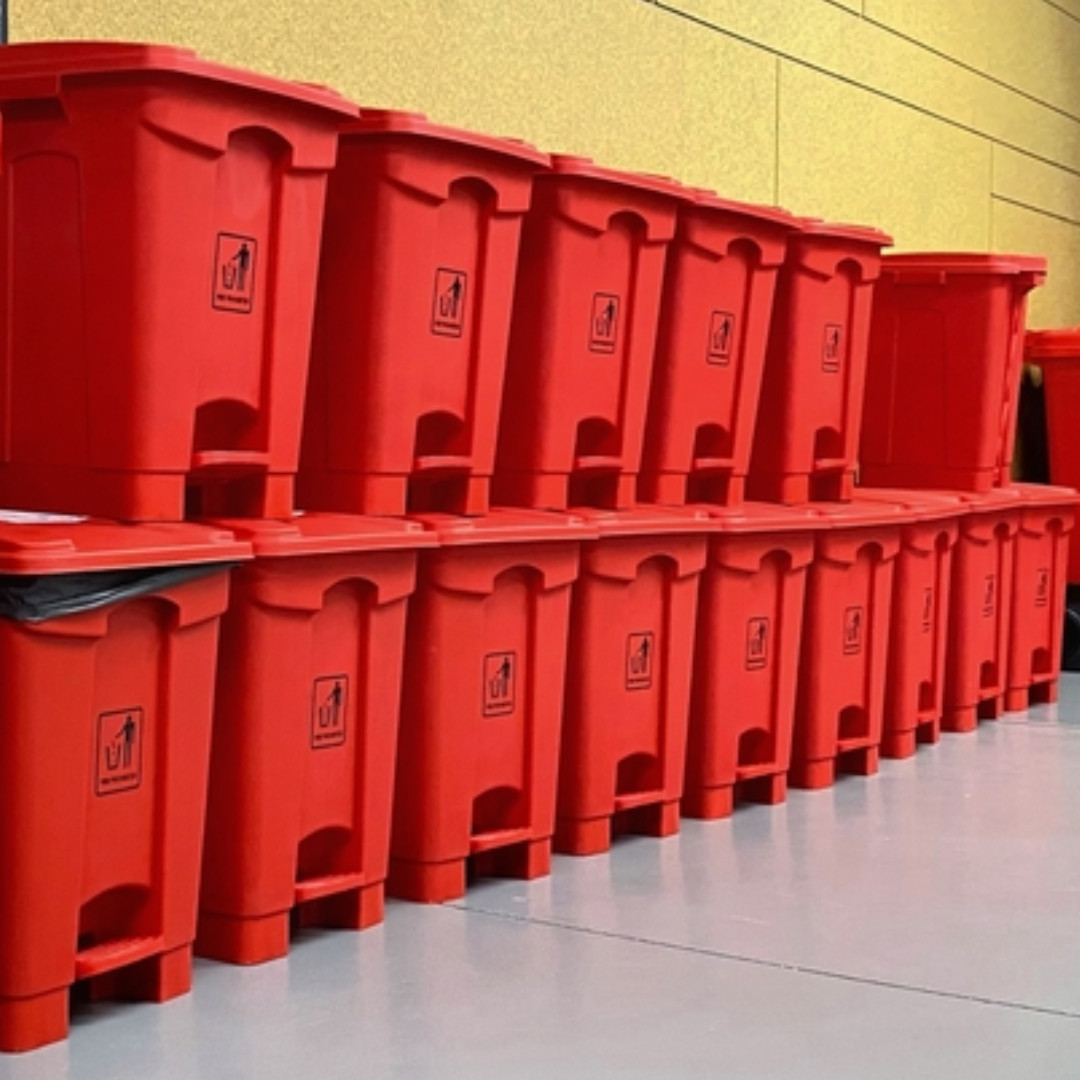It’s common for people with severe food allergies to carry an EpiPen. This is a pen-like device prefilled with a drug called epinephrine that you inject into yourself in the event of an allergic emergency. The injection immediately opens the airways and relieves potentially life-threatening symptoms of severe allergic reactions like anaphylaxis. Having an EpiPen nearby is a precautionary measure that can save your life if you are accidentally exposed to an allergy-causing substance (an allergen). You will likely have more than one auto-injector which you can keep at the office or carry with you while you are on the road traveling.
EpiPens don’t last forever and need to be disposed of if used or expired. If this happens, you can’t just toss them into the wastebasket. The devices need to be disposed of properly to prevent harm to others.
This article explains why used EpiPens are considered hazardous waste and some of their disposal laws. It also explains how to dispose of an EpiPen, whether used or expired, safely.
Dangers of Improper EpiPen Disposal
EpiPens are comprised of a prefilled cartridge of epinephrine and a spring-loaded plunger that propels a needle into the skin when pressed against the outer thigh. Any medical devices that can puncture or cut the skin are known as “sharps.”
You should treat used sharps, including EpiPens, as hazardous waste to avoid spreading bloodborne diseases such as HIV, hepatitis B, and hepatitis C.
In medical practice, the proper handling of sharps is part of a practice known as standard precautions (formerly “universal precautions”) used to avoid the spread of disease in healthcare settings.
The same precautions are needed at home with devices like EpiPens. If not disposed of properly, family members, housekeepers, janitors, or sanitation workers might accidentally get stuck with a needle while handling garbage. Standard precautions prevent disease transmission, however low or high the risk might be.
EpiPen Ingredients
Epinephrine used in EpiPen auto-injectors belongs to a class of medications called alpha- and beta-adrenergic agonists that work by relaxing the muscles in the airways and tightening blood vessels. This helps ease breathing and counteracts potentially dangerous drops in blood pressure that can occur with anaphylaxis.
EPA Recommendations
EpiPens that have been disposed of are considered medical waste irrespective of whether they are used or not. Medical waste is regulated in the United States by the Environmental Protection Agency (EPA).
Sharps Disposal Regulations
According to EPA guidelines, if you use sharps to manage your medical condition, you need to have a sharps disposal container that’s been cleared by the Food and Drug Administration (FDA).
FDA-cleared sharps containers should be:
- Closable
- Puncture-resistant
- Leak-proof on the side and bottom
- Labeled or color-coded
You can find FDA-cleared sharps containers at pharmacies, medical supply companies, healthcare providers, and online. If a sharps container is not available, you can use strong, sealable plastic containers (like a used laundry detergent container) in its place.
In Texas, for example, you can put sharps into any strong, sealable plastic container (like a used laundry detergent container) and throw it away with regular garbage after marking “DO NOT RECYCLE” on the outside.
By contrast, California law requires you to take all sharps containers to a designated disposal site. Penalties of up to $70,000 may be applied if hazardous wastes are improperly and wantonly disposed of.
Check with your state department of health if you are unsure how to properly dispose of sharps, including EpiPens. Your local sanitation department can also usually help.
How to Dispose of Used Auto-Injectors
If you have used an EpiPen, immediately return it to its container to avoid a needlestick injury. If you have a sharps container, you can place it there. If you don’t have a sharps container, you can put it in a heavy, sealable plastic container until you are ready to dispose of it.
Some states allow you to transport used EpiPens in medical waste bags. These puncture-resistant bags are usually color-coded red and clearly labeled with a biohazard symbol. Some healthcare providers will offer these to patients who use EpiPens.
There are several places you can take a used EpiPen:
- A designated sharps disposal drop-off site operated in many communities
- To the healthcare provider who prescribed the EpiPen (who can also give you a new prescription)
- A nearby hospital
- Your local pharmacy (call in advance to see if they accept used sharps)
If you called an ambulance due to an anaphylactic emergency, you could give them the auto-injector to dispose of.
How to Dispose of Expired Auto-Injectors
If your EpiPen is unused and expired, you can dispose of it through drug take-back programs in many communities. While these are generally intended for controlled medications like opioid drugs, you can use them to dispose of any unused medicine.
The Drug Enforcement Agency (DEA) has a registry of authorized drug take-back locations, which you can access through the EPA’s online locator.
Some pharmacies also offer on-site drop-off boxes, mail-back programs, and other ways to help you safely dispose of unused medicines. Your healthcare provider will also usually take back and dispose of expired auto-injectors.
Common Mistakes to Avoid
Epinephrine is a highly unstable drug. It can easily lose its potency if left in an overheated car or exposed to extreme cold. You can tell if epinephrine has gone bad by looking at the liquid through the window of the auto-injector. If it is cloudy, you need a new EpiPen.
The problem with this, of course, is that people often do not check their EpiPens until they need it. By that time, the drug may be tainted or have expired. Because epinephrine is so unstable, the expiration date is relatively short—usually one year from the date of manufacture.
To avoid unexpected problems with your EpiPen:
- Ask your pharmacist for an EpiPen with the latest (rather than most recent) expiration date.
- Get a thick marker and write the expiration date prominently on the front of the box.
- Store the box on a shelf or cabinet that you regularly use. Don’t hide it away somewhere where you might forget it.
- Keep the EpiPen with the most recent expiration date in front of those with later expiration dates.
- Ensure that auto-injectors are kept at room temperature. Don’t place them on a windowsill where they may get too hot or too cold.
- If you use a calendar app, set a reminder one month before an EpiPen is due to expire so that you have time to get a new one.
- Periodically check your auto-injectors to ensure the fluid inside is clear.
Summary
A used or expired EpiPen should not be tossed into the garbage as it can cause a needlestick injury in someone handling the bag. Needlestick injuries can potentially expose people to bloodborne diseases like hepatitis B, hepatitis C, or HIV.
It’s best to store used or expired EpiPens in a sharps container until you can safely dispose of them. If one is not available, a sturdy, puncture-resistant container will do. State laws vary on sharps disposal, but you can generally dispose of them at your healthcare provider’s office, a nearby hospital, some pharmacies, and designated sharps disposal sites operated in some communities.
Ensure that you always have an adequate stock of EpiPens on hand. Check the expiration date, replace them if they are due to expire, and avoid exposing the autoinjector to extreme cold or heat.
A Word From Verywell
If your doctor recommends an EpiPen auto-injector, it is because you are at high risk of severe and potentially life-threatening allergic reactions. This means that you always need to carry an auto-injector with you, especially when you travel.
When traveling with EpiPens, do not leave them in your checked luggage or carry them in an inside jacket pocket where they can get overheated. Consider taking a portable sharps container, available online and in many drugstores, if you are on extended travel.
This post, Learn How to Dispose of Your Used or Expired EpiPen, was first published by Verywell Health on May 24, 2023.











